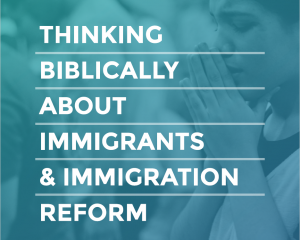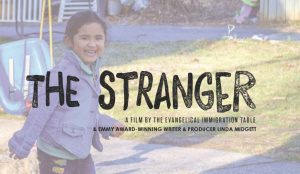BIBLICAL RESOURCES
Start diving deeper into discussions about immigration as a Christian. No matter where you are in your journey uncovering God’s love for immigrants – whether you are looking for inspiration from Scripture, you are in need of biblical resources for preaching and teaching, or you simply have some questions about the immigration debate – there’s something for you here.

THINKING BIBLICALLY E-BOOK & VIDEOS
For evangelical Christians, our approach to immigrants and to immigration policy should be guided first and foremost by the Bible. Watch and share these six videos exploring how biblical principles should guide our thinking – and then download your free e-book and take the experiential learning journey to dive deeper.

SCRIPTURE READINGS
I Was a Stranger: What the Bible Says about Immigrants — Want to know what the Bible says about loving our immigrant neighbors? Download this FREE guide highlighting 40 places in Scripture that show God’s love for those who have been displaced.

PREACHING AND TEACHING RESOURCES
Preaching and Teaching Resources — The significant majority of evangelicals say they would like to hear a sermon focused on how biblical principles and examples can be applied to immigration in the United States – but many pastors are simply not sure where to begin as they preach on this complicated topic. We hope this resource will help you to craft a biblically-faithful message that reflects God’s heart for immigrants.

THE STRANGER (FILM)
THE STRANGER is a 40-minute documentary film commissioned by the Evangelical Immigration Table and produced by Emmy-award winning producer Linda Midgett. The Stranger profiles three immigrant stories and includes interviews with local and national Christian leaders.

SMALL GROUP GUIDE
Discovering and Living God’s Heart for Immigrants: A Guide to Welcoming the Stranger – A six-session curriculum appropriate for small groups or Adult Education classes, featuring readings, activities, prayer suggestions and short video introductions to each session from Welcoming the Stranger co-authors, Matthew Soerens and Jenny Yang.
This download is available underneath the description of the book.

IMMIGRATION PRIMER
Immigration is a complex issue that can be difficult to understand. This primer provides an overview of our current immigration system and is a helpful starting point for those who wish to become more informed on this issue.

CHURCH LEADER GUIDE
Church Leader’s Guide to Immigration – Pastors and other church leaders face many complex questions as they seek to serve, love and reach the immigrants within their communities. This guide from World Relief provides straight-forward answers to many of the most common questions, both legal and practical.
FREQUENTLY ASKED QUESTIONS
God tells us throughout the Scriptures that he loves and has a special concern for the immigrant (Deut 10:18, Ps 146:9), and he commands his people to do the same (Lev 19:33-34). God commanded the Israelites to treat the foreign-born the same as they treated native-born Israelites (Ex 12:49), but he also instituted special provisions for immigrants, along with other vulnerable groups such as orphans and widows (Deut 24:19-21, Mal 3:5).
In the New Testament, Jesus makes clear in the parable of the Good Samaritan that God’s command to love our neighbor includes migrants in need (Lk 10:25-37). He instructs us to welcome the stranger, for in doing so we are welcoming Christ himself (Mt 25:31-46). And he commissions us to “make disciples of all nations” (Mt 28:19), which immigration has made possible for everyone, right within our own communities.
According to the US Department of Homeland Security, there were 12.1 million undocumented immigrants living in the U.S. in 2014. Of those, about 40% entered lawfully with a visa, but overstayed, while the rest entered illegally. While about 55%-60% of undocumented immigrants come from Mexico, there are also millions of undocumented Asian, African, and European immigrants—so this is certainly not just a Mexican issue. Most immigrants without legal status, like those with legal status, come to improve their economic situation, to reunite families or fleeing persecution or violence in their country of origin.
Under US law, refugees are individuals who have fled their countries of origin because of a well-founded fear of persecution on account of their race, religion, political opinion, national origin, or social group. Over the past decade, the US has generally accepted between 70,000 and 85,000 refugees annually, less than one-half of one percent of the 25.4 million refugees in the world, but the number of refugees admitted has significantly declined beginning in 2017. Refugees are admitted with legal status and work authorization, and are resettled throughout the US with the assistance of one of nine national non-profit organizations, most of which are faith-based organizations.
There are four basic ways that a person might obtain Lawful Permanent Resident status in the US:
- Family-Based Immigration—but backlogs can be as long as 20 years, and many others do not have a close relative who is a U.S. citizen or Lawful Permanent Resident who qualifies to sponsor them.
- Employment-Based Immigration—but these visas are almost exclusively reserved for those with “advanced degrees” and “extraordinary abilities,” not for those content to do low wage labor.
- Refugee or Asylee Status—for a small share of those fleeing persecution because of race, religion, national origin, political opinion, or social group, but not for those fleeing poverty, natural disasters, or environmental degradation.
- Diversity Visa Lottery—but the odds of winning have been about 1 in 300 in recent years, and it’s only a possibility for individuals from “under-represented” countries, not for those from Mexico, the Philippines, India, China, and other “over-represented” countries.
Many individuals who come and find work in the U.S. do not fit into any of these categories, so there is really no “line” in which they could begin to wait; there is no legal way for them to come under current law, nor any lawful opportunity for them to legalize their status once they are here.
Actually, almost all economists agree that immigrants are good for the US economy overall, including those who are undocumented (96% of economists surveyed by the Wall Street Journal said that undocumented immigrants had a net positive impact on the US economy). Contrary to popular perception, most undocumented immigrants do pay taxes. Like immigrants with legal status or US citizens, undocumented immigrants pay sales taxes and property taxes. The Social Security Administration estimates that about half of undocumented immigrants have Social Security, Medicare, and income taxes deducted from their paychecks. The administration has taken in as much as $12 billion annually in recent years, in contributions from, among others, undocumented immigrants without a Social Security number, who will not be eligible to receive Social Security benefits upon reaching retirement age under current law. In many cases, undocumented immigrants are still ineligible for public benefits such as welfare or food stamps.
Romans 13:1-4 makes very clear that Christ-followers are to submit to the governmental authorities that God has established. While there may be situations when “we must obey God rather than man” (Acts 5:29), we should not lightly brush aside this biblical command. However, we can uphold the importance of the rule of law without necessarily deporting millions of people; we could insist upon other penalties for entering or overstaying a visa unlawfully, such as a significant fine.
It is also important to recognize that there is no conflict between the submission to authority mandated in Romans 13 and serving undocumented immigrants: we can minister to immigrants’ physical needs, help to teach them English, share the good news of the gospel and advocate for just policies that would better their situation—all without violating the law.
The ideal of the rule of law that we find in Scripture guides us to reform the dysfunctions of our current legal system. Since we live in a democracy, we can advocate for immigration policies that are both welcoming of immigrants and maintain the importance of the rule of law.
The very small percentage of the world’s refugees whom the US selects for resettlement each year are subjected to the most thorough vetting process of any category of immigrant or visitor who enters the US. That process generally takes between 18 and 36 months and is coordinated between the US Departments of Homeland Security, State, and Defense as well as the National Counterterrorism Center and the FBI. It involves multiple in-person interviews, biographic and biometric background checks, and a health screening all before a refugee is allowed to enter the US. The best evidence that this system is working well is that, since the Refugee Act was passed in 1980, no American lives have ever been lost in a terrorist attack perpetrated by someone who came through the US refugee resettlement program. We have a strong history as a nation of being both pro-security and pro-compassion.
Demographers tell us that immigrant churches are the fastest growing segment of evangelical churches in the US. Increasingly, when we talk about “those people,” we are talking about ourselves, because the Church is one Body of which each of us is an interdependent part. When one part suffers—and many immigrant brothers and sisters are suffering, as individuals are forced into the shadows and families are divided by current laws—every part suffers (1 Cor 12:12-26). Many immigrants bring with them a vibrant faith that can help to reinvigorate our churches; others will encounter the gospel for the first time in the US, presenting a great mission on our doorstep.
Pray—for immigrants in your community and for your political leaders
Listen—to Scripture and to the stories of immigrant sisters and brothers
Educate—dedicate a sermon, adult education class, or special forum to help educate your congregation
Advocate—your legislators need to hear the moral voice of the church; some church leaders have written to or met with their elected officials
Serve—we can share God’s love by helping to teach immigrants important skills, such as the English language, and build relationships in the process
Evangelism—in the context of relationship, we have the opportunity to share the hope of the gospel
Hundreds of national evangelical leaders have affirmed the Evangelical Statement of Principles for Immigration Reform, which calls for a bipartisan solution that:
- Respects the God-given dignity of every person
- Protects the unity of the immediate family
- Respects the rule of law
- Guarantees secure national borders
- Ensures fairness to taxpayers
- Establishes a path toward legal status and/or citizenship for those who qualify and who wish to become permanent residents


